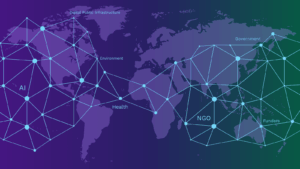Data is paramount to all economic and social activities nowadays and the debate around how to use, access, and secure it has evolved and become more complex, with a growing set of voices joining the debate. Governments, the private sector, not-for-profits, and communities are all struggling with the same challenge: how to responsibly unlock the value of data. It’s no surprise therefore that various actors are independently developing data governance “principles” to guide actions around anything from data management to data sharing practices, highlighting their needs, demands, and rights.
In this blog, we take a look at some of the data governance principles available or under development, explore their scope, and assess how their proliferation is impacting efforts to handle data more responsibly. The Datasphere Initiative team undertook initial research identifying 35 different actors who are developing data governance principles.
Principles are often recognized as useful governance tools
Although they are non-binding norms, principles have emerged as useful governance tools in a variety of sectors and contexts. With respect to data, principles can enable a better understanding of communities’ concerns and guide fair and ethical uses of data and digital technologies. Principles also can serve as a way to distribute power and in the context of the “data economy” they can help define how data can be accessed and used in a way that protects communities’ rights and cultures.
A range of international organizations have or are in the process of developing data governance principles. Often these are focused on one aspect of data governance such as privacy (e.g., the W3C, the OECD, or the APEC principles) or artificial intelligence.
Standard-setting bodies are also tackling specific aspects of data governance be it of a technical nature and often specific to technological use or a sectoral environment. Data targeted and governed by these types of principles often surround public (government data) or personal and sometimes corporate data (which is owned by companies). Topics and priorities range from sectors to stages of the data lifecycle. Principles cover sectors such as health, mobility, trade, education, agriculture, and statistics, among others. They also target moments in the data lifecycle and cover issues from data management to data sharing.
Communities are also using principles as a way to develop their own unique approaches to how to govern data
Various minorities and vulnerable communities – e.g., indigenous communities, women groups, and health practitioners – have identified the need to develop and launch their own set of guiding data governance principles. These principles often portray and reflect what a community understands as “responsible” ways that (their) data should be used and its value should be unlocked and shared.
Examples of such efforts include the CARE Principles of Indigenous Data Governance, the Principles of Maori Data Sovereignty, the Data Feminism Principles, the Principles for Responsible Clinical Trial Data Sharing, and the Framework for Responsible Sharing of Genomic and Health-Related Data.
The principles identified share the transversal goal of promoting equity, inclusion, and ethics in data management, data sharing, and overall throughout the data life cycle. They tend to focus on the fair and ethical use of data, privacy protection, and the protection of human rights. In line with the equity objective, the majority of the principles focus on benefitting specific human groups and communities. Communities for which principles were specifically developed are indigenous peoples, women, children, and other vulnerable populations, such as patients.
While the development of principles can be a positive sign that more actors are taking data governance seriously, a proliferation of approaches could lead to fragmentation
Overall, principles provide context and sector-specific approaches that can lead to best practices, but also they foster an understanding of the needs and rights of certain sectors and populations across actors. This can help guide future economic, technological, and policy interventions. Yet, the number of principles is increasing and they have often been developed in a siloed and context-specific way. Finding routes to navigate them and share best practices across countries and sectors is urgent if we want to have interoperable approaches to how we govern data.
The concept of the Datasphere offers assistance in this regard, since it allows for a comparison of principles, clarifying what they offer, how they are similar, how they differ, and potentially, what they are lacking.
The Datasphere is a complex system encompassing all types of data and their dynamic interactions with human groups and norms. Each set of principles can be analyzed and their elements can be distributed under each of the three components of the Datasphere concept “data”, “norms”, and “human groups”. This textual analysis – on which the Datasphere Initiative has embarked – allows for a deeper understanding of the various voices in this ecosystem.
One interesting example of how the existing principles can be analyzed through the lens of the Datasphere are the FAIR and the CARE principles. On the one hand, the FAIR principles have a heavily data-driven approach, and they focus on data management practices and other technicalities around data findability, accessibility, interoperability, and reuse. On the other hand, the CARE principles – which emerged as a response to the gaps left by the FAIR principles – place a heavy emphasis on a specific human group: indigenous peoples. They thus seek to develop guidelines around indigenous data governance, as well as highlight the importance of data being used for the collective benefit, in a responsible and ethical way, and of communities having authority to control it. Elements of the Datasphere can hence be more heavily incorporated into some sets of data governance principles, and materialize different communities’ needs.
Benchmarking existing principles will help support understanding and coordinate efforts
The first step to fostering an understanding of emerging approaches is a comprehensive analysis and benchmarking of the existing data governance principles. This is especially urgent when the call for a global convention is repeatedly appearing in the international community dialogue (e.g. WEF, UN agencies, G20 under India presidency call). At the Datasphere Initiative, we are actively participating in these discussions, and offering expertise via research and events. Identifying how existing principles materialize people’s concerns around their rights and the impacts of the data economy in their lives, and turning those into technology and services design practice, is needed to enhance the trust and equity distribution. A general mapping of existing principles can help identify the issues they seek to address, and potentially find the commonalities that all should focus on while recognizing differences that also need to be addressed.
The Datasphere Initiative team is mapping data governance principles across sectors and around the world.
Are you undertaking similar research and/or would like to contribute to the effort? Reach out to us at [email protected].




